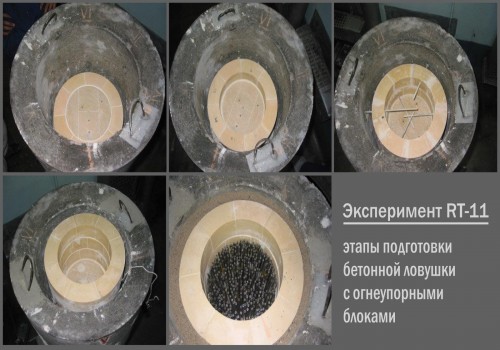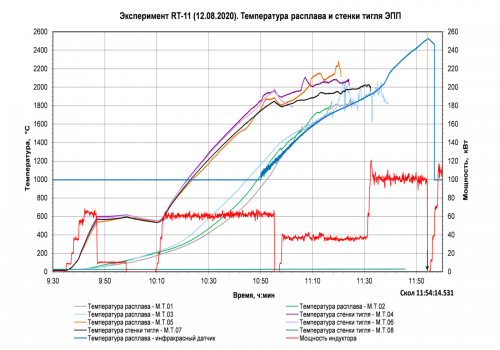RT-11 Experiment
21 August 2020


RT-11 experiment has been realized in the National Nuclear Center of RK at “Lava-B” experimental facility under “Cormit-II” international project implementation in cooperation with Japan Toshiba Energy Systems & Solutions Corporation through the intermediary of the Marubeni Utility Services, Ltd.
It was the regular full-scale experiment out of experiment series to study the interaction of corium melt and refractory materials of two types – aluminum oxide and zirconium oxide.
During the experiment the molten charge was obtained from pellets of depleted uranium dioxide, metallic zirconium iodide and zirconium oxide powder by induction heating in graphite crucible of electric furnace. Produced molten of 2500 °С was discharged into the concrete trap with refractory units made of zirconium oxide. Residual energy release in model corium was simulated by induction heater around the concrete trap.
Currently there are regular post-experimental activities and material testing studies conducted as a result of which data will be obtained on degree of corium melt interaction with protective materials of sub-reactor room in the event of an accident with possible melt failure outside the reactor vessel.
* “Cormit-II” project is aimed at study of light water nuclear reactor molten core materials (corium) interaction with refractory materials in case of severe accident. Cooperative efforts of Kazakhstani and Japanese specialists involves realization of experimental and material research studies of corium contacting with different refractory materials (such as zirconium dioxide and aluminum oxide) in conditions of residual energy release simulation in corium. The whole practical part of studies has been realizing at the experimental base of the National Nuclear Center of RK. The large-scale experiments are carried out at “Lava-B” facility within “Angara” test-bench; the small-scale ones – at HFG-135. All mentioned facilities are located at the territory of Research Reactor Complex “Baikal-1”.
Latest news by category:
-
NNC RK Featured at IAEA Regional Event in Yerevan
11 February 2026
-
Advances in IGR Reactor Conversion Program
10 February 2026
-
Development of Highly Qualified Scientific Staff: New Opportunities
03 February 2026
-
Technical Coordination Meeting Conducted as Part of the EAGLE Experimental Program
30 January 2026